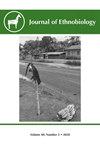透过土地了解云:两个纳华土著社区的农业实践对气候变化的感知
IF 1.3
3区 社会学
Q1 ANTHROPOLOGY
引用次数: 3
摘要
摘要气候变化对农业及其维持的生计至关重要。为了更好地理解气候脆弱性是如何在农业环境中表达的,有必要解决人们如何感知和与周围环境互动的问题。这项研究分析了墨西哥不同海拔高度的两个土著社区农民对一组气候变化指标的看法及其对农业实践的影响。使用半结构化访谈对农民的观察进行了探讨,并将其置于当地工具性气候记录的背景中。利用逻辑回归模型进一步分析了这些农民的认知对其农业实践的影响。雨强度和季节性的变化,以及风强度的变化,被提及的频率最高。农民的经验表明,雨和风的强度降低,雨季缩短。过去异常年份的记忆与仪器记录中发现的降水异常相吻合。然而,温度变化和生物指标很少被察觉。我们的研究结果表明,对这些指标的感知是由农业实践调节的,我们发现有证据表明,在季节日历的第一阶段,这些感知会导致播种日期的调整。此外,农民通过向外迁移、整合经济作物和使用商业肥料来应对或减少气候影响造成的作物损失。本文章由计算机程序翻译,如有差异,请以英文原文为准。
Knowing the Clouds through the Land: Perceptions of Changes in Climate through Agricultural Practices in Two Nahua Indigenous Communities
Abstract. Changes in climate are important for agriculture and the livelihoods it sustains. To improve the understanding of how climate vulnerability is expressed in agricultural environments, it is necessary to address how people perceive and interact with their surroundings. This study analyzes farmers' perceptions of a set of climate change indicators and their influence on agricultural practices in two Indigenous communities located at different altitudes in Mexico. Farmers' observations were explored using semi-structured interviews and contextualized within the local instrumental climate record. The influence of these farmers' perceptions on their agricultural practices was further analyzed using a logistic regression model. Changes in rain intensity and seasonality, as well as in wind intensity, were mentioned most frequently. Farmers' experiences suggest a reduction in rain and wind intensity and shorter rainy seasons. Memories of past anomalous years coincide with precipitation anomalies found in the instrumental records. However, temperature changes and biotic indicators were seldom perceived. Our results show that the perception of these indicators is mediated by agricultural practices, and we found evidence indicating that these perceptions during the first stage of the seasonal calendar induce readjustments in sowing dates. Moreover, farmers resort to out-migration, integration of cash crops, and use of commercial fertilizers to cope with or reduce crop loss due to climate impacts.
求助全文
通过发布文献求助,成功后即可免费获取论文全文。
去求助
来源期刊

Journal of Ethnobiology
Social Sciences-Anthropology
CiteScore
4.80
自引率
3.40%
发文量
21
审稿时长
>12 weeks
期刊介绍:
JoE’s readership is as wide and diverse as ethnobiology itself, with readers spanning from both the natural and social sciences. Not surprisingly, a glance at the papers published in the Journal reveals the depth and breadth of topics, extending from studies in archaeology and the origins of agriculture, to folk classification systems, to food composition, plants, birds, mammals, fungi and everything in between.
Research areas published in JoE include but are not limited to neo- and paleo-ethnobiology, zooarchaeology, ethnobotany, ethnozoology, ethnopharmacology, ethnoecology, linguistic ethnobiology, human paleoecology, and many other related fields of study within anthropology and biology, such as taxonomy, conservation biology, ethnography, political ecology, and cognitive and cultural anthropology.
JoE does not limit itself to a single perspective, approach or discipline, but seeks to represent the full spectrum and wide diversity of the field of ethnobiology, including cognitive, symbolic, linguistic, ecological, and economic aspects of human interactions with our living world. Articles that significantly advance ethnobiological theory and/or methodology are particularly welcome, as well as studies bridging across disciplines and knowledge systems. JoE does not publish uncontextualized data such as species lists; appropriate submissions must elaborate on the ethnobiological context of findings.
 求助内容:
求助内容: 应助结果提醒方式:
应助结果提醒方式:


